2023-2024学年英语鲁教版(五四学制)八年级下册Unit 7 I used to be afraid of the dark.复习课件(共48张PPT)
文档属性
| 名称 | 2023-2024学年英语鲁教版(五四学制)八年级下册Unit 7 I used to be afraid of the dark.复习课件(共48张PPT) | 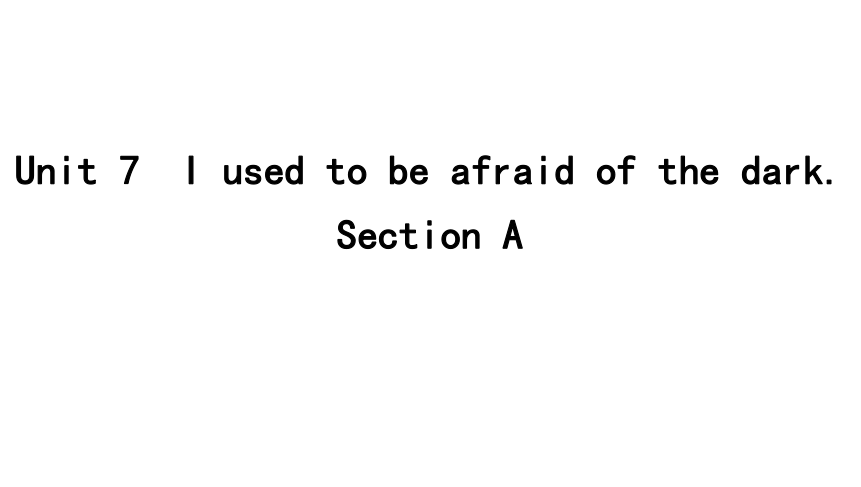 | |
| 格式 | pptx | ||
| 文件大小 | 383.3KB | ||
| 资源类型 | 教案 | ||
| 版本资源 | 鲁教版 | ||
| 科目 | 英语 | ||
| 更新时间 | 2024-07-06 10:47:24 | ||
图片预览


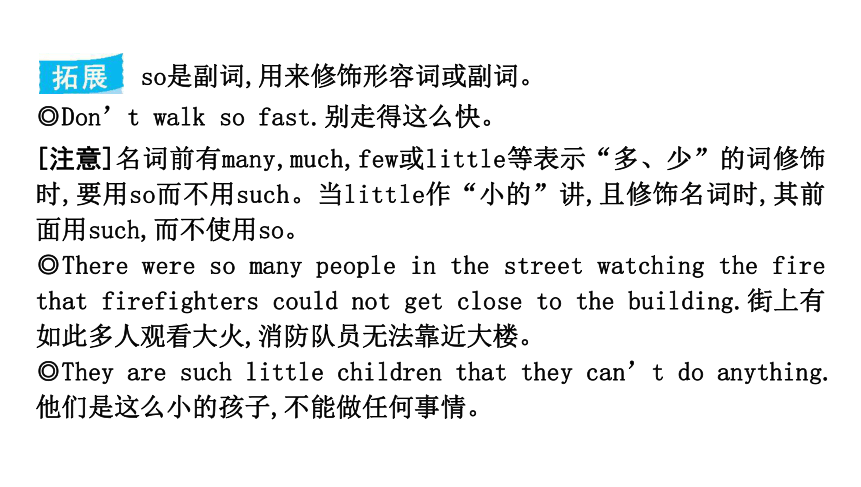
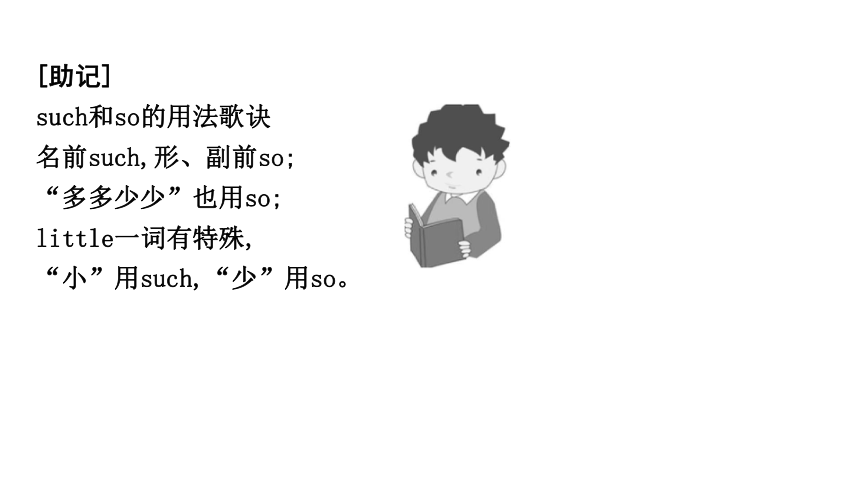

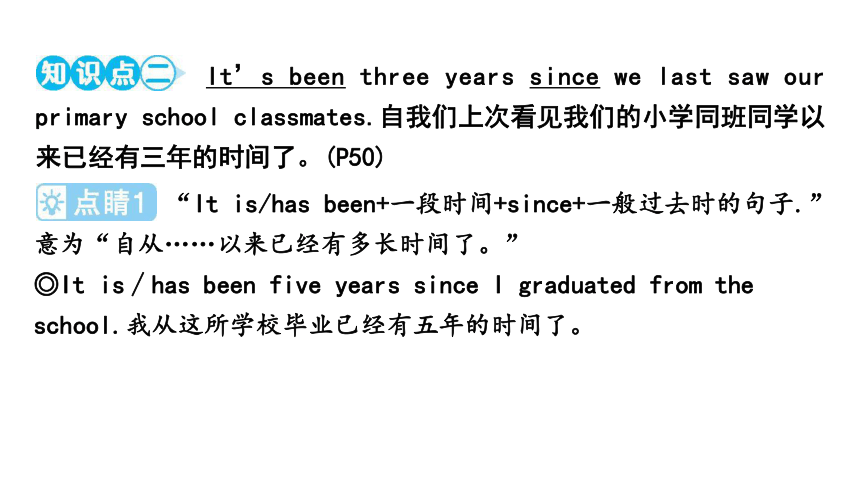
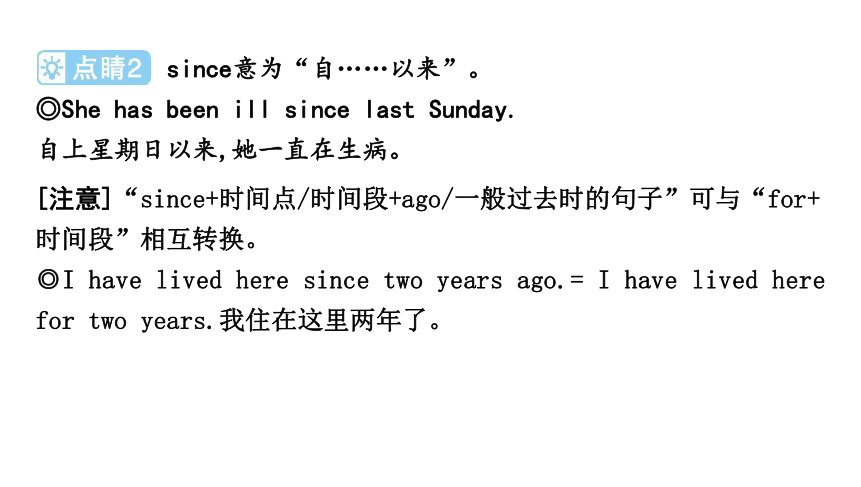
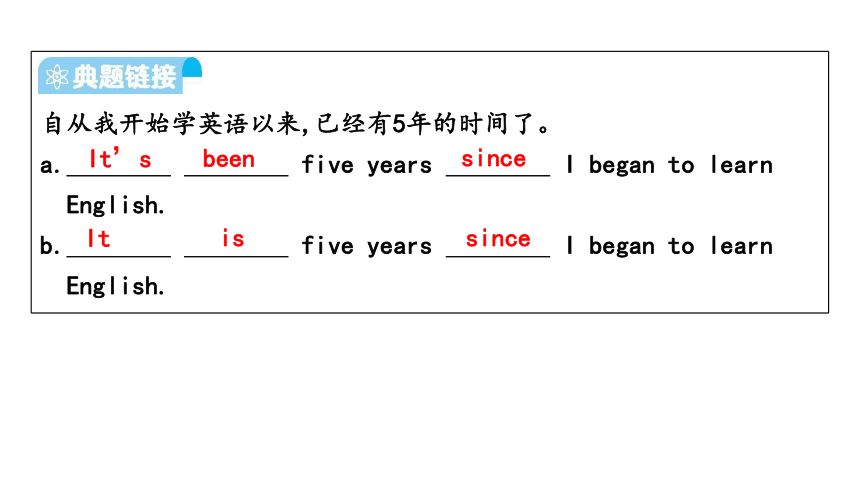
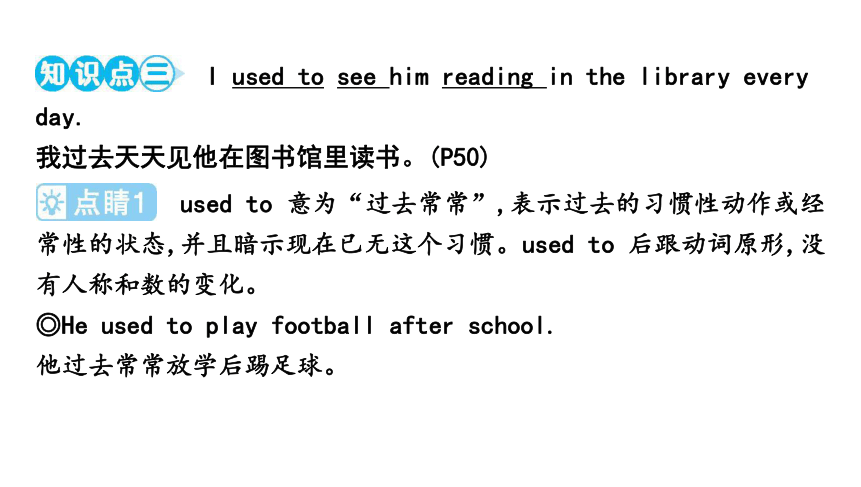
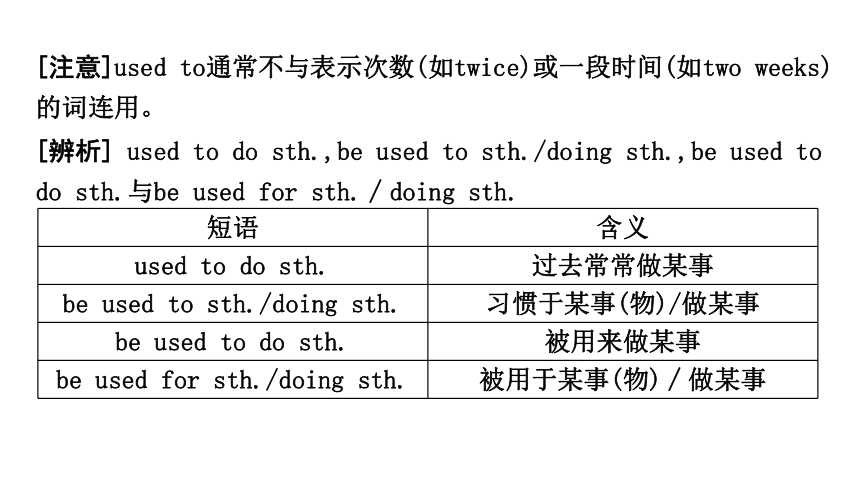
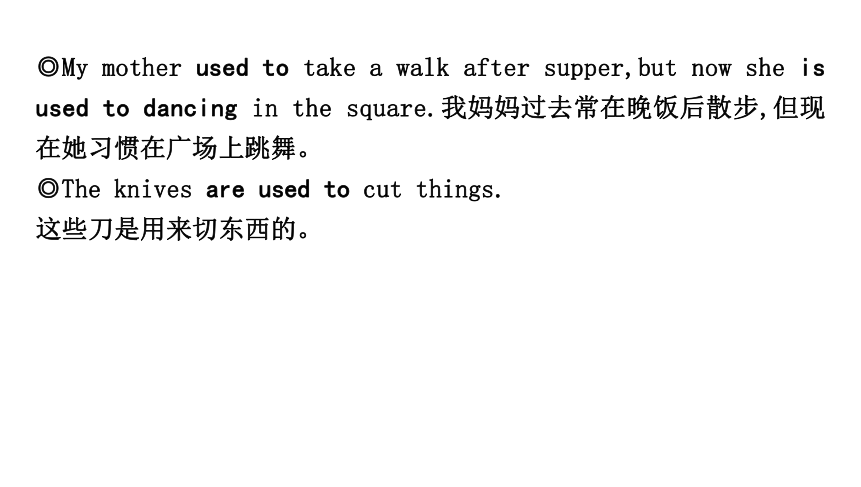
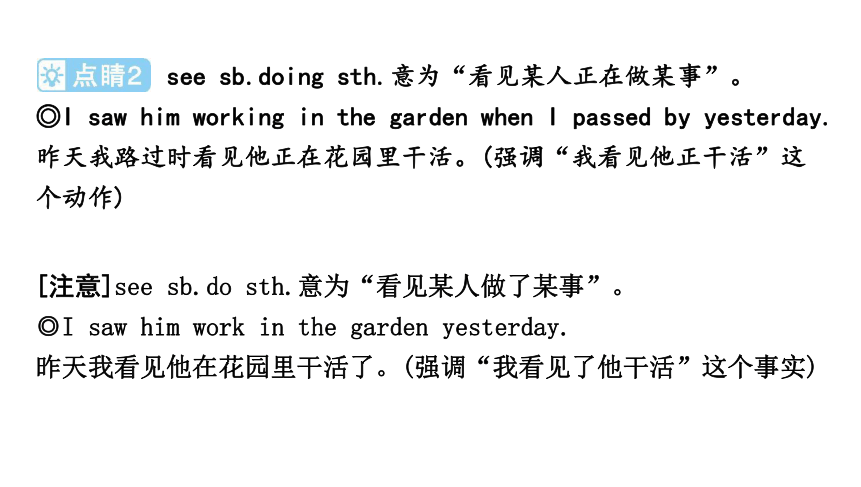
文档简介
(共48张PPT)
Unit 7 I used to be afraid of the dark.
Section A
This party is such a great idea!
(举办)这次聚会是如此好的一个主意! (P50)
such意为“这样的;那样的;类似的”,是形容词,作定语修饰名词时,须放在名词之前。
◎I’ve never seen such a big house before.
我以前从未见过这么大的房子。
so是副词,用来修饰形容词或副词。
◎Don’t walk so fast.别走得这么快。
[注意]名词前有many,much,few或little等表示“多、少”的词修饰时,要用so而不用such。当little作“小的”讲,且修饰名词时,其前面用such,而不使用so。
◎There were so many people in the street watching the fire that firefighters could not get close to the building.街上有如此多人观看大火,消防队员无法靠近大楼。
◎They are such little children that they can’t do anything.他们是这么小的孩子,不能做任何事情。
[助记]
such和so的用法歌诀
名前such,形、副前so;
“多多少少”也用so;
little一词有特殊,
“小”用such,“少”用so。
1.They are such interesting books.
2.I’m very surprised that he has made such great progress.
3.他得了如此重的感冒以至于日日夜夜咳嗽。(so...that/such...
that)
它们是如此有趣的书。
我很吃惊他已经取得了如此大的进步。
He got such a bad cold that he coughed day and night./He
got so bad a cold that he coughed day and night.
It’s been three years since we last saw our primary school classmates.自我们上次看见我们的小学同班同学以来已经有三年的时间了。(P50)
“It is/has been+一段时间+since+一般过去时的句子.”意为“自从……以来已经有多长时间了。”
◎It is∕has been five years since I graduated from the school.我从这所学校毕业已经有五年的时间了。
since意为“自……以来”。
◎She has been ill since last Sunday.
自上星期日以来,她一直在生病。
[注意]“since+时间点/时间段+ago/一般过去时的句子”可与“for+时间段”相互转换。
◎I have lived here since two years ago.= I have lived here for two years.我住在这里两年了。
自从我开始学英语以来,已经有5年的时间了。
a. five years I began to learn
English.
b. five years I began to learn
English.
It’s
been
since
It
is
since
I used to see him reading in the library every day.
我过去天天见他在图书馆里读书。(P50)
used to 意为“过去常常”,表示过去的习惯性动作或经常性的状态,并且暗示现在已无这个习惯。used to 后跟动词原形,没有人称和数的变化。
◎He used to play football after school.
他过去常常放学后踢足球。
[注意]used to通常不与表示次数(如twice)或一段时间(如two weeks)的词连用。
[辨析] used to do sth.,be used to sth./doing sth.,be used to do sth.与be used for sth.∕doing sth.
短语 含义
used to do sth. 过去常常做某事
be used to sth./doing sth. 习惯于某事(物)/做某事
be used to do sth. 被用来做某事
be used for sth./doing sth. 被用于某事(物)∕做某事
◎My mother used to take a walk after supper,but now she is used to dancing in the square.我妈妈过去常在晚饭后散步,但现在她习惯在广场上跳舞。
◎The knives are used to cut things.
这些刀是用来切东西的。
see sb.doing sth.意为“看见某人正在做某事”。
◎I saw him working in the garden when I passed by yesterday.
昨天我路过时看见他正在花园里干活。(强调“我看见他正干活”这个动作)
[注意]see sb.do sth.意为“看见某人做了某事”。
◎I saw him work in the garden yesterday.
昨天我看见他在花园里干活了。(强调“我看见了他干活”这个事实)
感官动词see/watch/notice/hear/feel后面有动词原形时表示动作的完整性、真实性;它们后面有“v.-ing”时表示动作的连续性、进行性。
1.Mr.Li used to (go) to school by bike.
2.Wood is used to (make) desks,chairs,tables and
so on.
3.When I was younger,I was used to (take) a walk
after dinner.
4.Mary saw Jim (read) a novel when she passed by
the library.
go
make
taking
reading
Candy told me that she used to be really shy and took up singing to deal with her shyness.坎迪告诉我她过去非常害羞,为了应对自己的羞怯开始学唱歌。(P51)
take up意为“开始从事;占去(空间或时间)”。
◎When did you take up Japanese
你什么时候开始学日语的
take构成的短语还有:
take off 脱下;起飞 take over 接管
take on 承担 take care 小心
take out 拿出;取出 take down 拿下;记下
take place 发生;举行 take it easy 从容;轻松
deal with 意为“应对;处理”,常与how连用。
◎—How did you deal with the sick dog
你怎么处理那只病狗的
—I sent it to the animal hospital.
我把它送到了动物医院。
do with意为“处理;利用”,常与what连用。
◎What will you do with the old computers
你将怎样处理这些旧电脑
shyness意为“害羞;腼腆”,是由形容词shy加后缀-ness构成的名词。
I have overcome my shyness.
我已克服了我的腼腆。
1.At last I overcame my (shy) and became brave.
2.莉萨在12 岁时开始弹钢琴。
3.The boy’s desk took up too much space in the room.
4.我想知道怎样处理污染。
shyness
Lisa took up playing the piano at the age of 12.
房间里男孩的书桌占据了太多的空间。
I want to know how to deal with the pollution/what to do with the pollution.
However,too much attention can also be a bad thing.然而,(受到)太多的关注也可能是一件不好的事情。(P51)
[辨析] too much与much too
too much 意为“太多”。much为中心词,可修饰不可数名词、动词,也可充当代词,代替上下文提到的事物
much too 意为“太;非常”。too为中心词,在句中修饰形容词或副词
◎Tom became much too fat because he ate too much meat.汤姆变得太胖了,因为他吃了太多的肉。
[助记] too much和much too用法歌诀
too much,much too,去掉前词看后头;
much可接不可数,有时也可用作副;
too则修饰形或副,以上规则请记住。
1.吃太多盐对我们的健康没有好处。
Eating salt is not good for our health.
2.在我看来,这价格太高了。
It’s my view that the price is high.
too
much
much
too
...you have to be prepared to give up your normal life.……你必须准备好放弃你的正常生活。(P51)
be prepared to do sth.意为“愿意做某事;准备好做 某事”。
◎Are you prepared to give up freedom
你愿意放弃自由吗
give up意为“放弃”,可用名词、代词或动名词作宾语。give up是“动词+副词”型短语,人称代词的宾格作宾语时,应将人称代词的宾格放在give和up之间;后接名词作宾语时,放在up之前或之后均可。
◎My father has given up smoking.
我爸爸已经戒烟了。
◎Math is difficult for me,but I won’t give it up.
数学对我来说太难了,但我不会放弃它。
有些动词或短语后面必须用动名词作宾语,而不能跟不定式作宾语。常见的这类动词或短语有mind,enjoy,practise,be busy等。
[助记]
巧记只能跟动名词作宾语的动词或短语
期待、练习、值得忙;
(look forward to,practise,be worth,be busy)
继续、习惯、别放弃;
(keep,be used to,give up)
考虑、建议、不禁想;
(consider,suggest,can’t help,feel like)
喜欢、避免、要介意。
(enjoy,avoid,mind)
1.我为考试做好了准备。
2.英语很重要。不要放弃它。
I am prepared to take the exam.
English is very important.Don’t give it up.
Only a very small number of people make it to the top.只有极少数的人能够成功到达巅峰。(P51)
a number of意为“许多……”,后接可数名词复数,在句中作主语时,谓语动词用复数形式,其中number为名词,意为“数目;数量”,可用large,great,big,small等词修饰。
◎A large number of students like reading.相当多的学生喜欢 读书。
[注意]the number of意为“……的数目;……的数量”,后接可数名词复数,作主语时,谓语动词用单数形式。
◎The number of the students is about 1,500 in our school.
我们学校学生的人数大约是1 500。
make it 意为“获得成功”。
◎You will make it if you try.
如果你努力的话你会成功的。
make it的用法:
◎You needn’t worry.He will make it.
你不必担心。他会办成的。
◎The train leaves in five minutes.We’ll never make it.
火车再有五分钟就离开了。我们绝对赶不上了。
◎We are too late.I don’t think we can make it.
我们太迟了。我想我们不会准时赶到了。
◎—When shall we meet
我们将什么时候见面
—Let’s make it at seven o’clock tomorrow morning.
咱们把时间定在明天早上七点吧。
◎He has had a high fever,but it doesn’t mean he can’t make it.
他发高烧了,但这并不意味着他挺不过去。
1.一小部分学生每天步行去上学。
2.我们班学生的人数是40。
3.Believe in yourself.You can make it.
A small number of students walk to school every day.
The number of the students in our class is 40.
相信你自己。你能获得成功。
Section B
When he was a little boy,he seldom caused any problems...当他还是个小男孩时,他很少惹麻烦……(P54)
seldom意为“不常;很少”,是频度副词,在句中一般位于系动词、情态动词、助动词之后,实义动词之前。
◎He is seldom late for school.他很少上学迟到。
[注意]seldom表示否定意义,因此含seldom的句子变反意疑问句时,附加疑问部分用肯定形式。
◎Danny seldom goes to the zoo,does he
丹尼很少去动物园,是吗
英语中还有很多频度副词,不表示具体的频率、次数。如always(一直;总是),usually(通常),often(时常;常常),sometimes
(有时),never(从不)等。请看下面的图解(阴影部分表示各自的频率):
always
100%
总是
usually
约80%
通常
often
约60%
时常
sometimes
约30%
有时
seldom
约5%
很少
never
0%
从不
1.He is seldom nervous about exams.
2.这个男孩很少吃早饭。这是个不好的习惯。
他很少对考试紧张。
The boy seldom eats breakfast.It’s a bad habit.
But he missed his parents so much and he often felt lonely and unhappy.
但是他很想念他的父母,并且他经常感到孤独和不开心。(P54)
[辨析] lonely与alone
lonely 用作形容词,它在句中既可作定语,也可作表语,意为“孤独的;寂寞的;偏僻的”。该词带有浓厚的感彩
alone 用作形容词时只作表语和后置定语,意为“独自的;单独的”。用作副词时,意为“独自;单独”
The old man lived in a lonely village,and he lived a hard life alone,but he didn’t feel lonely.
这位年长的男士居住在一个偏僻的山村里,独自过着艰难的生活,但是他并不觉得孤独。
[助记]
read alone
feel lonely
The old woman lives in the small village .But she doesn’t feel .
A.alone;alone B.alone;lonely
C.lonely;alone D.lonely;lonely
Sometimes he was absent from classes and failed his examinations.
他有时逃课,且考试不及格。(P54)
be absent from意为“缺席……”。
◎Mr.Wang will be absent from the meeting this afternoon.王老师将缺席今天下午的会议。
[注意]absent为形容词,意为“缺席;不在”,其名词形式为absence,意为“缺席;不在”。
◎Ms.Green will be in charge during my absence.
我不在时,格林女士将负责(工作)。
fail意为“不及格;失败”。常用结构:fail to do sth./ fail in doing sth.“做某事失败”。
◎Jim failed to persuade his mother.= Jim failed in persuading his mother.吉姆没能说服他的妈妈。
1.The boy was (absence) from classes because he was
ill in hospital.
2.He never gives up even if he (fail) or meets
difficulties.
absent
fails
Finally,Li Wen’s parents made the decision to send him to a boarding school.最后,李文的父母决定把他送到一所寄宿学校。(P54)
make a∕the decision to do sth.意为“决定做某事”,相当于decide to do sth.。
◎He made a∕the decision to buy a new car.= He decided to buy a new car.他决定买一辆新车。
[注意]decision为名词,其动词形式为decide“决定”。
“send sb.to +地点”意为“送/派某人去某地”。
◎Peter’s boss has sent him to New York.
彼得的老板已经派他去了纽约。
(1)send sb.sth.= send sth.to sb.送给某人某物
◎Some friends sent him some money.=Some friends sent some money to him.一些朋友送给他一笔钱。
(2)send构成的短语:
1.I think you’ve made the correct (decide).
2.Shenzhou-16 spacecraft (send) up into space in
2023.
decision
was sent
They take pride in everything good that I do.他们为我做的一切好事感到自豪。(P54)
本句为复合句。that I do为定语从句,修饰不定代词everything。
take pride in 意为“为……感到自豪”,与be proud of同义。
◎Mr.Green takes pride in his son.= Mr.Green is proud of his son.格林先生为他儿子感到自豪。
[注意]pride为名词,意为“自豪;骄傲”,其形容词为proud,意为“自豪的;骄傲的”。
◎The proud hate pride in others.
骄傲自大的人憎恨别人的骄傲自大。
1.屠呦呦是所有中国人的骄傲。
2.She is proud of what you’ve done.
Tu Youyou is the pride of all Chinese people.
她为你所做的感到骄傲。
Unit 7 I used to be afraid of the dark.
Section A
This party is such a great idea!
(举办)这次聚会是如此好的一个主意! (P50)
such意为“这样的;那样的;类似的”,是形容词,作定语修饰名词时,须放在名词之前。
◎I’ve never seen such a big house before.
我以前从未见过这么大的房子。
so是副词,用来修饰形容词或副词。
◎Don’t walk so fast.别走得这么快。
[注意]名词前有many,much,few或little等表示“多、少”的词修饰时,要用so而不用such。当little作“小的”讲,且修饰名词时,其前面用such,而不使用so。
◎There were so many people in the street watching the fire that firefighters could not get close to the building.街上有如此多人观看大火,消防队员无法靠近大楼。
◎They are such little children that they can’t do anything.他们是这么小的孩子,不能做任何事情。
[助记]
such和so的用法歌诀
名前such,形、副前so;
“多多少少”也用so;
little一词有特殊,
“小”用such,“少”用so。
1.They are such interesting books.
2.I’m very surprised that he has made such great progress.
3.他得了如此重的感冒以至于日日夜夜咳嗽。(so...that/such...
that)
它们是如此有趣的书。
我很吃惊他已经取得了如此大的进步。
He got such a bad cold that he coughed day and night./He
got so bad a cold that he coughed day and night.
It’s been three years since we last saw our primary school classmates.自我们上次看见我们的小学同班同学以来已经有三年的时间了。(P50)
“It is/has been+一段时间+since+一般过去时的句子.”意为“自从……以来已经有多长时间了。”
◎It is∕has been five years since I graduated from the school.我从这所学校毕业已经有五年的时间了。
since意为“自……以来”。
◎She has been ill since last Sunday.
自上星期日以来,她一直在生病。
[注意]“since+时间点/时间段+ago/一般过去时的句子”可与“for+时间段”相互转换。
◎I have lived here since two years ago.= I have lived here for two years.我住在这里两年了。
自从我开始学英语以来,已经有5年的时间了。
a. five years I began to learn
English.
b. five years I began to learn
English.
It’s
been
since
It
is
since
I used to see him reading in the library every day.
我过去天天见他在图书馆里读书。(P50)
used to 意为“过去常常”,表示过去的习惯性动作或经常性的状态,并且暗示现在已无这个习惯。used to 后跟动词原形,没有人称和数的变化。
◎He used to play football after school.
他过去常常放学后踢足球。
[注意]used to通常不与表示次数(如twice)或一段时间(如two weeks)的词连用。
[辨析] used to do sth.,be used to sth./doing sth.,be used to do sth.与be used for sth.∕doing sth.
短语 含义
used to do sth. 过去常常做某事
be used to sth./doing sth. 习惯于某事(物)/做某事
be used to do sth. 被用来做某事
be used for sth./doing sth. 被用于某事(物)∕做某事
◎My mother used to take a walk after supper,but now she is used to dancing in the square.我妈妈过去常在晚饭后散步,但现在她习惯在广场上跳舞。
◎The knives are used to cut things.
这些刀是用来切东西的。
see sb.doing sth.意为“看见某人正在做某事”。
◎I saw him working in the garden when I passed by yesterday.
昨天我路过时看见他正在花园里干活。(强调“我看见他正干活”这个动作)
[注意]see sb.do sth.意为“看见某人做了某事”。
◎I saw him work in the garden yesterday.
昨天我看见他在花园里干活了。(强调“我看见了他干活”这个事实)
感官动词see/watch/notice/hear/feel后面有动词原形时表示动作的完整性、真实性;它们后面有“v.-ing”时表示动作的连续性、进行性。
1.Mr.Li used to (go) to school by bike.
2.Wood is used to (make) desks,chairs,tables and
so on.
3.When I was younger,I was used to (take) a walk
after dinner.
4.Mary saw Jim (read) a novel when she passed by
the library.
go
make
taking
reading
Candy told me that she used to be really shy and took up singing to deal with her shyness.坎迪告诉我她过去非常害羞,为了应对自己的羞怯开始学唱歌。(P51)
take up意为“开始从事;占去(空间或时间)”。
◎When did you take up Japanese
你什么时候开始学日语的
take构成的短语还有:
take off 脱下;起飞 take over 接管
take on 承担 take care 小心
take out 拿出;取出 take down 拿下;记下
take place 发生;举行 take it easy 从容;轻松
deal with 意为“应对;处理”,常与how连用。
◎—How did you deal with the sick dog
你怎么处理那只病狗的
—I sent it to the animal hospital.
我把它送到了动物医院。
do with意为“处理;利用”,常与what连用。
◎What will you do with the old computers
你将怎样处理这些旧电脑
shyness意为“害羞;腼腆”,是由形容词shy加后缀-ness构成的名词。
I have overcome my shyness.
我已克服了我的腼腆。
1.At last I overcame my (shy) and became brave.
2.莉萨在12 岁时开始弹钢琴。
3.The boy’s desk took up too much space in the room.
4.我想知道怎样处理污染。
shyness
Lisa took up playing the piano at the age of 12.
房间里男孩的书桌占据了太多的空间。
I want to know how to deal with the pollution/what to do with the pollution.
However,too much attention can also be a bad thing.然而,(受到)太多的关注也可能是一件不好的事情。(P51)
[辨析] too much与much too
too much 意为“太多”。much为中心词,可修饰不可数名词、动词,也可充当代词,代替上下文提到的事物
much too 意为“太;非常”。too为中心词,在句中修饰形容词或副词
◎Tom became much too fat because he ate too much meat.汤姆变得太胖了,因为他吃了太多的肉。
[助记] too much和much too用法歌诀
too much,much too,去掉前词看后头;
much可接不可数,有时也可用作副;
too则修饰形或副,以上规则请记住。
1.吃太多盐对我们的健康没有好处。
Eating salt is not good for our health.
2.在我看来,这价格太高了。
It’s my view that the price is high.
too
much
much
too
...you have to be prepared to give up your normal life.……你必须准备好放弃你的正常生活。(P51)
be prepared to do sth.意为“愿意做某事;准备好做 某事”。
◎Are you prepared to give up freedom
你愿意放弃自由吗
give up意为“放弃”,可用名词、代词或动名词作宾语。give up是“动词+副词”型短语,人称代词的宾格作宾语时,应将人称代词的宾格放在give和up之间;后接名词作宾语时,放在up之前或之后均可。
◎My father has given up smoking.
我爸爸已经戒烟了。
◎Math is difficult for me,but I won’t give it up.
数学对我来说太难了,但我不会放弃它。
有些动词或短语后面必须用动名词作宾语,而不能跟不定式作宾语。常见的这类动词或短语有mind,enjoy,practise,be busy等。
[助记]
巧记只能跟动名词作宾语的动词或短语
期待、练习、值得忙;
(look forward to,practise,be worth,be busy)
继续、习惯、别放弃;
(keep,be used to,give up)
考虑、建议、不禁想;
(consider,suggest,can’t help,feel like)
喜欢、避免、要介意。
(enjoy,avoid,mind)
1.我为考试做好了准备。
2.英语很重要。不要放弃它。
I am prepared to take the exam.
English is very important.Don’t give it up.
Only a very small number of people make it to the top.只有极少数的人能够成功到达巅峰。(P51)
a number of意为“许多……”,后接可数名词复数,在句中作主语时,谓语动词用复数形式,其中number为名词,意为“数目;数量”,可用large,great,big,small等词修饰。
◎A large number of students like reading.相当多的学生喜欢 读书。
[注意]the number of意为“……的数目;……的数量”,后接可数名词复数,作主语时,谓语动词用单数形式。
◎The number of the students is about 1,500 in our school.
我们学校学生的人数大约是1 500。
make it 意为“获得成功”。
◎You will make it if you try.
如果你努力的话你会成功的。
make it的用法:
◎You needn’t worry.He will make it.
你不必担心。他会办成的。
◎The train leaves in five minutes.We’ll never make it.
火车再有五分钟就离开了。我们绝对赶不上了。
◎We are too late.I don’t think we can make it.
我们太迟了。我想我们不会准时赶到了。
◎—When shall we meet
我们将什么时候见面
—Let’s make it at seven o’clock tomorrow morning.
咱们把时间定在明天早上七点吧。
◎He has had a high fever,but it doesn’t mean he can’t make it.
他发高烧了,但这并不意味着他挺不过去。
1.一小部分学生每天步行去上学。
2.我们班学生的人数是40。
3.Believe in yourself.You can make it.
A small number of students walk to school every day.
The number of the students in our class is 40.
相信你自己。你能获得成功。
Section B
When he was a little boy,he seldom caused any problems...当他还是个小男孩时,他很少惹麻烦……(P54)
seldom意为“不常;很少”,是频度副词,在句中一般位于系动词、情态动词、助动词之后,实义动词之前。
◎He is seldom late for school.他很少上学迟到。
[注意]seldom表示否定意义,因此含seldom的句子变反意疑问句时,附加疑问部分用肯定形式。
◎Danny seldom goes to the zoo,does he
丹尼很少去动物园,是吗
英语中还有很多频度副词,不表示具体的频率、次数。如always(一直;总是),usually(通常),often(时常;常常),sometimes
(有时),never(从不)等。请看下面的图解(阴影部分表示各自的频率):
always
100%
总是
usually
约80%
通常
often
约60%
时常
sometimes
约30%
有时
seldom
约5%
很少
never
0%
从不
1.He is seldom nervous about exams.
2.这个男孩很少吃早饭。这是个不好的习惯。
他很少对考试紧张。
The boy seldom eats breakfast.It’s a bad habit.
But he missed his parents so much and he often felt lonely and unhappy.
但是他很想念他的父母,并且他经常感到孤独和不开心。(P54)
[辨析] lonely与alone
lonely 用作形容词,它在句中既可作定语,也可作表语,意为“孤独的;寂寞的;偏僻的”。该词带有浓厚的感彩
alone 用作形容词时只作表语和后置定语,意为“独自的;单独的”。用作副词时,意为“独自;单独”
The old man lived in a lonely village,and he lived a hard life alone,but he didn’t feel lonely.
这位年长的男士居住在一个偏僻的山村里,独自过着艰难的生活,但是他并不觉得孤独。
[助记]
read alone
feel lonely
The old woman lives in the small village .But she doesn’t feel .
A.alone;alone B.alone;lonely
C.lonely;alone D.lonely;lonely
Sometimes he was absent from classes and failed his examinations.
他有时逃课,且考试不及格。(P54)
be absent from意为“缺席……”。
◎Mr.Wang will be absent from the meeting this afternoon.王老师将缺席今天下午的会议。
[注意]absent为形容词,意为“缺席;不在”,其名词形式为absence,意为“缺席;不在”。
◎Ms.Green will be in charge during my absence.
我不在时,格林女士将负责(工作)。
fail意为“不及格;失败”。常用结构:fail to do sth./ fail in doing sth.“做某事失败”。
◎Jim failed to persuade his mother.= Jim failed in persuading his mother.吉姆没能说服他的妈妈。
1.The boy was (absence) from classes because he was
ill in hospital.
2.He never gives up even if he (fail) or meets
difficulties.
absent
fails
Finally,Li Wen’s parents made the decision to send him to a boarding school.最后,李文的父母决定把他送到一所寄宿学校。(P54)
make a∕the decision to do sth.意为“决定做某事”,相当于decide to do sth.。
◎He made a∕the decision to buy a new car.= He decided to buy a new car.他决定买一辆新车。
[注意]decision为名词,其动词形式为decide“决定”。
“send sb.to +地点”意为“送/派某人去某地”。
◎Peter’s boss has sent him to New York.
彼得的老板已经派他去了纽约。
(1)send sb.sth.= send sth.to sb.送给某人某物
◎Some friends sent him some money.=Some friends sent some money to him.一些朋友送给他一笔钱。
(2)send构成的短语:
1.I think you’ve made the correct (decide).
2.Shenzhou-16 spacecraft (send) up into space in
2023.
decision
was sent
They take pride in everything good that I do.他们为我做的一切好事感到自豪。(P54)
本句为复合句。that I do为定语从句,修饰不定代词everything。
take pride in 意为“为……感到自豪”,与be proud of同义。
◎Mr.Green takes pride in his son.= Mr.Green is proud of his son.格林先生为他儿子感到自豪。
[注意]pride为名词,意为“自豪;骄傲”,其形容词为proud,意为“自豪的;骄傲的”。
◎The proud hate pride in others.
骄傲自大的人憎恨别人的骄傲自大。
1.屠呦呦是所有中国人的骄傲。
2.She is proud of what you’ve done.
Tu Youyou is the pride of all Chinese people.
她为你所做的感到骄傲。
同课章节目录
- Unit 1 When was heborn?
- Section A
- Section B
- Unit 2 It's a nice day, isn't it?
- Section A
- Section B
- Unit 3 Where would you like to visit?
- Section A
- Section B
- Unit 4 How can we become good learners?
- Section A
- Section B
- Unit 5 I think that mooncakes are delicious!
- Section A
- Section B
- Unit 6 Could you please tell me where the restroom
- Section A
- Section B
- Unit 7 I used to be afraid of the dark.
- Section A
- Section B
- Unit 8 What are the shirts made of?
- Section A
- Section B
